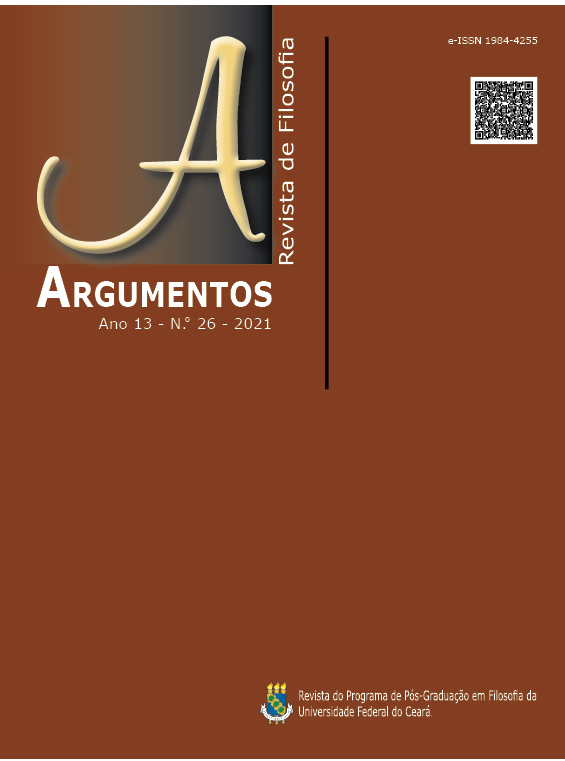Nietzsche and Heidegger: truth, value and foundation
DOI:
https://doi.org/10.36517/Argumentos.26.1Keywords:
Nietzsche. Heidegger. Truth. Value. Plea.Abstract
Heidegger posits Nietzsche as the last metaphysician, in a line that can be traced back to Plato and who has historically displayed a cover-up of being. In this article we will seek to address Heidegger’s criticism of Nietzsche with the aim of realizing that it is sustained from a cut of the Nietzschean value-truth relation. The central hypothesis will maintain that, while Heidegger seeks to position – from the aforementioned clipping - his criticism in analytical-argumentative terms, it unfolds rather from the value that each author gives to the truth in terms of foundation.
References
CONSTANTE, A. A propósito del Nietzsche de Heidegger. Signos filosóficos, Méjico, 6, 2001. 85-112.
DAVIS, M. E. Martin Heidegger: Key Concepts, Durham: Acumen, 2010.
FOUCAULT, M. Nietzsche, la généalogie, l’ histoire. Hommage à Jean Hyppolite, París, PUF, 1971. 145-172
HEIDEGGER, M. Nietzsche I, trad. Juan Luis Vermal. Barcelona: Destino, 2000a.
HEIDEGGER, M. Nietzsche II, trad. Juan Luis Vermal. Barcelona: Destino, 2000b.
HEIDEGGER, M. Gesamtausgabe 87 -Nietzsche: Seminare 1937 und 1944, Peter von Ruckteschell (ed). Barcelona: Herder, 2004.
HEIDEGGER, M. Ser y tiempo. Madrid: Trotta, 2012.
HEIDEGGER, M. On the Origin of the Work of Art: First Version. Heidegger Reader, Indiana Univ. Press, trad. Jerome Veith, 2009. 130-150
HEIDEGGER, M. Zum Ereignis-Denken (GA 73.1). Peter Trawny (ed.), Frankfurt a/M: Vittorio Klostermann, 2013.
KRELL, D. Art and Truth in Raging Discord: Heidegger and Nietzsche on the Will to Power. Martin Heidegger and Literature 4/2 (1976), Duke Univ. Press. 378-392.
LÖWITH, K. Les implications politiques de la philosophie de l'existence de Martin Heidegger. Les temps modernes, París, 14, 1946. 342-374.
NIETZSCHE, F. Fragmentos Póstumos. Madrid: Tecnos, 2008.
NIETZSCHE, F. Más allá del bien y del mal. Madrid: Alianza, 2007a.
NIETZSCHE, F. El crepúsculo de los ídolos. Madrid: Alianza, 2007b.
NIETZSCHE, F. Genealogía de la moral. Madrid: Alianza, 2000.
NIETZSCHE, F. La ciencia jovial. Madrid: Biblioteca Nueva, 2001.
NIETZSCHE, F. Sobre verdad y mentira en sentido extramoral. Madrid: Península, 2003.
STATEN, H. The Problem of Nietzsche’s Economy. Representations, n. 27, Univ. of California Press, 1989. 66-91
STEVENS, J. On the Morals of Genealogy. Political Theory, Vol. 31, n. 4, Sage Publications, 2003. 558-588
VERAZA TONDA, P. El pensar del Ereignis de Heidegger como otra fenomenología. Método e inicio del camino. Franciscanum 165, Vol. Lviii, 2016. 89-116.
VATTIMO, G. Diálogo con Nietzsche. Buenos Aires: Paidós, 2002.
Véliz Rodríguez, S. y Montagud Micó, A. Nietzsche desenmascara a Heidegger. El genio maligno, 15, 2014. 21-54.
Vermal, J. L. Acerca de la inversión del platonismo en Nietzsche y Heidegger. Estudios Nietzsche, 10, 2010. 97-111.
ZENGOTITA, A. Nietzsche y Darwin: el valor de un discurso como ficción útil. Estudos Nietzsche, 7/2, 2016, 56-79.
Downloads
Published
Issue
Section
License
Argumentos magazine is licensed under an International Creative Commons Attribution License.
The Magazine uses CC BY inclusion
1) The authors retain the copyright granted to the magazine or the right to initial publication, with the work regularly licensed under the Creative Commons Attribution, which allows the sharing of the work with acknowledgment of authorship and initial publication in this magazine.
2) The authors are authorized to contract additional applicable contracts, for non-exclusive distribution of the version of the work published in this journal (for example, publication in the institutional repository or as a chapter of the book), recognition of authorship and initial publication in this journal.
3) Authors are authorized and encourage to publish and distribute their work online (for example, in institutional repositories or on their personal pages) at any time before or during the editorial process, as they can generate productive changes, as well as increase the impact and reference of published work.




.jpg)










._._3.png)
1.jpg)
._._._.png)
